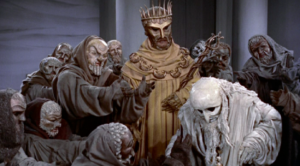[Greek] ὄψις (opsis), [Latin] faciem: appearance, vision, optics, countenance, face, look, sight, act of seeing, view, aspect, that which is visible; Jn.11:44, Rev.1:16, Jn.7:24

Elements of opsis: (costumes and masks) were designed to evoke an emotional response from the audience
Background Information:
Greek theater: This Greek term is appropriately tied to the theater. The theater (theatron) is a place of seeing. Opsis pertains to the visual elements of a theatrical production. Such elements, including masks, scenery, costumes, props, and decorations, are intended to evoke emotional responses from the audience. The dramatic tragedies and comedies performed on the stage typically evoke such emotional responses. Plato, whose philosophy of ideas is an extended meditation of sight, believed opsis was an important component of the theater. This idea begins the later study of studying the optics for a target audience.
Old Testament: This term takes on a variety of meanings and uses. Out of the ground, the Lord God made grow every tree that was delightful to look at and good for food (Gen.2:9). Joseph was strikingly handsome in countenance and body (Gen.39:6). The lampstand was made according to the patter which the Lord had shown Moses (Num.8:4). Face to face I speak to him (Moses) (Num.12:8). I saw there the glory of God (Ezek.8:4). God knows well the moment you ate of the apple (Gen.3:15). Moses stands on the rock in Horeb in the presence of the elders of Israel (Ex.17:6).
New Testament: On the other hand, this term, found quite infrequently in the New Testament, refers to faces and physical appearances. Lazarus’ wrapped face appears in John’s gospel. Jesus’ shining face appears in Revelation. In a more nuanced way, Jesus makes references to first impressions and appearances. Interestingly, this term provides the basis for describing the common elements of the synoptic gospels of Matthew, Mark, and Luke.
Scripture:
“Lazarus came out, tied hand and foot with burial bands, and his face was wrapped in a cloth.” Jn.11:4
It was the customary burial practice to wrap the dead in a burial cloth. Jesus then restores Lazarus back to life.
“His face shone like the sun at its brightest.” Rev.1:16
Jesus is shown in His glory as His face shines like the sun.
“Stop judging by appearances, but judge justly.” Jn.7:24
The Jews were astonished by how Jesus, who did not receive formal training from the rabbis, was able to teach in the temple. Jesus claimed His authority come the Father. The Jews presumed that Jesus was possessed.
Synoptic gospels: The term synoptic derives from syn- (together) and opsis (view). Essentially, these three gospels take a common view toward the stories, teachings, and parables of Jesus. These gospels give an account of these events from the same point of view. In contrast, the gospel of John speaks of Jesus divine nature and contains no parables.
Conclusion:
Optic, synoptic, synopsis autopsy, face
As you already know, optics technically deals with light properties and diffraction. However, this term can have many meanings and uses. In the early Greco-Roman era, this term is easily identified with the stage. Even now, we continue to “see” the stage and theaters as places of spectacle.
It is interesting to see how this term is used in such various ways at a given time in history. The Old Testament uses this term in a multitude of ways. For example, this term “sheds some light” on the ways God communicates with man throughout the Old Testament. However, in the New Testament, this term is very narrowly used. We all have heard of the synoptic gospels. We can identify what they are. But I never really knew what this term actually meant. These three gospels basically have a common view (optics) of Jesus.
An autopsy is a thorough medical examination of a body, using one’s own eyes. In recent years optics has become a very important subject matter in politics. Optics is the study of how the audience (outsiders) perceive an issue. Many political consultants and advisors have made a career of this profession. I think you can see how this situation could play out. The consultant says to the congressmen, “Sir, the optics of this situation does not look good to the voters. You need make a statement categorically denying this.”
